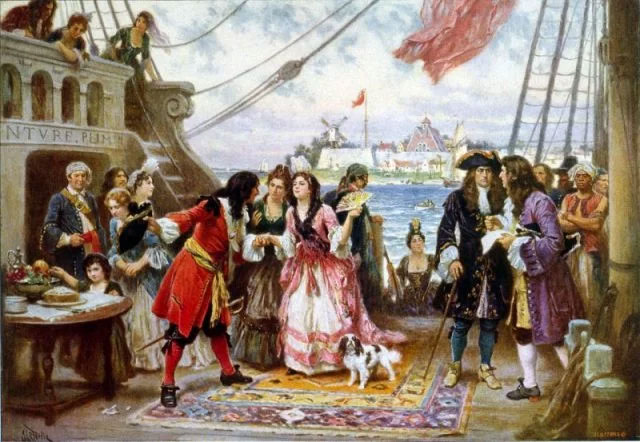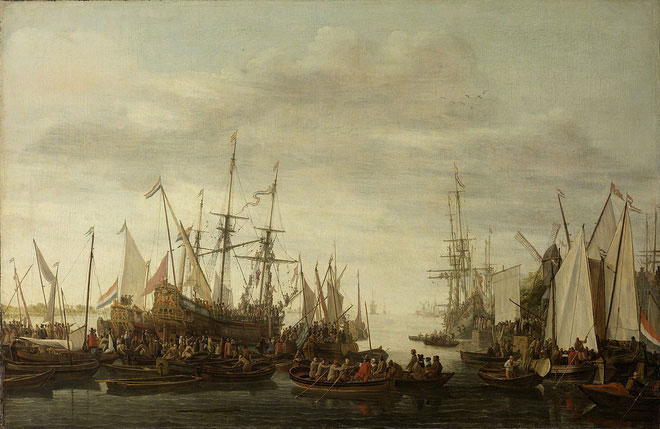Learn about Pirate Law - golden rule in the 17th century
On the Golden Age of Pirates that lasted for 100 years, the black flag fluttering in the salty wind used to be a fear all over the world.
On the film, the majority of pirates only know how to kill, robbery has overshadowed the truth about the most organized criminal organization in the world. They are not only eye-catching sailors, have a wooden leg, slurping in confusing languages with parrots standing on their shoulders, they are skilled sailors, living in a complex organization no different from a good Yakuza. Modern Mafia.
According to researcher Peter T. Leeson from George Mason University, many years of understanding the rules, the economy and the pirate organization show, the bandits on the water use a set of civil constitution. own owners to manage, avoid the case of party clashes and through it, increase the amount of stolen wealth. Besides, they prevented the case of rebellion, robbing the captain with a system of "checking and balancing the crew".

Captain Kidd in New York Harbor, painted by Jean Leon Gerome Ferris.
On the ship there is a separate hierarchy. Since piracy acts as an organization, it can be considered a profession, but an organized occupation, there must be a law. Everyone must obey the law and if there are individuals opposed, they will be punished immediately. History does not record the capture of sailors on the board to get into the water, but a couple of places show that there is a more frightening method of condemnation: keel-hauling, temporarily translating along the boat.
The fined person will be tied to the rope, pulled from side to side on the opposite boat screen or from the beginning to the end of the boat. The person either drowned, or was scratched by the oysters that clung to the bottom of the boat, or bumped the head hard and suffered long-term damage. The Dutch Navy has officially applied this punishment, but the number of incidents is rare due to its brutality.

The painting redraws the trial in the form of keel-hauling, between 1660 and 1686.
Pirates have developed very well without being affected by the law. They created rules on the "playground" that accounted for 71% of the Earth. Sometimes there will be the participation of a few people in the government, but each individual participant must know his role to behave. The crew is no different than pirate movies: slaves escape the whip, dissatisfied sailors, who are bored of poverty . This is one of the exact points when comparing movies with reality.
Leeson called the pirate one of the " most complex and successful criminal organizations in human history". Every seafarer has a duty to respect people over his rights. On a pirate ship, there is Captain - Captain, Train Driver - Quartermaster, Firecracker - Master Gunner, Sail Manager - Boatswain, commanding officer (eg doctor) and the remaining crew.
For ease of governance, sea bawlers created Pirate Code , which appeared in Pirates of the Golden Age 1620-1720. It was a time when precious goods went from India to the New World a lot, no wonder why it was so dangerous on the sea.

Pirate grave on St. IslandMary, Madagascar.
The bandits were outlawed, so they were very thirsty and greedy and solved most problems with violence. So the pirate community created a law consisting of 11 things, word of mouth from one boat to another, modifying itself to suit the situation:
Democracy is always upheld . Every seafarer has a vote, which has his or her own voice in general. The captain will be the final decision maker, but they will have to consider the opinion of the crew first.
Each crew member has the same ration and wine capacity . But when the property is robbed, each rank has its own preferences. As usual, the captain will be the one who gets the most, the lower rank will be less rewarded, so on to the crew.
However, the sharing is not too much difference. If the Captain receives two pieces of money, then the crew member is at least one.

Painter Howard Pyle redraws the pirate scene of property appropriation.
The biggest crime is stealing . Under the law, a sailor who steals property will be starved out of the desert island or die.
Sailors are allowed to choose furniture (clothes, items, .) I like on the stolen goods. However, goods taken from the robbery must be taken back to the boat, presented before the crew before sharing. If anyone took anything made of their own, they were accused of stealing the ship's money. Stealing crimes are unforgivable.

Howard Pyle described being abandoned on the island.
The crew complies with strict rules . The personal friction that leads to fights does not happen as often as we thought. Some captains will settle the case of disturbing the order on the boat with whips, some record that fighting will be subject to 40 whips. No friction is worth 40 whips to all, so most crews avoid causing trouble. Some captains allow seafarers to settle problems when they reach the shore.

Legendary pirate Edward Teach, nicknamed Blackbeard - Black Beard.
All candle lights are turned off at 8 pm so the crew can rest. Anyone who wants to drink will have to sit on the open compartment, drink in the dark.
Any sailor must be ready to fight . Guns must always be bullets, weapons must always be sharp.

The painting "Arresting the pirate, Blackbear, 1718" was painted by Jean Leon Gerome Ferris in 1920.
Completely forbidden sex on the ship . Women are forbidden to board the ship, anyone who breaks the rule must die. But history records a number of incidents of death because of women taking ships. Recently, there was a saying related to something blind, I forgot.
There is a Public Fund dedicated to sailors who lose their legs and arms during the "work" process, they will be compensated for 800 gold coins. Worse injuries will result in less compensation.
Everyone has to fight , anyone who escapes will be scorned. At the end of the battle, the crew will vote on what punishment to carry out with a coward. Lightly, losing the share of wealth is badly left out of the deserted island or condemned to death.
Musicians on board are allowed to play all day and night , except for the sabbath days - rest days to worship the Supreme Being.
- Discover the treasure of the notorious 17th century pirate off the coast of Madagascar
- Detecting the remains of the 18th century Caribbean Caribbean pirates
- Smartphone suspect in the 17th century painting
- Found the 17th-century female corpse buried with her husband's heart
- Special 'quality' pirates in history, more than Caribbean pirates
- Detecting wrecks from the 17th century
- Discover extremely sophisticated locking systems from the 17th century
- Golden hour for health care
- Why do pirates always cover one eye?
- Excavation of ancient tsarist chessboard
- Search for Viking pirate descendants
- Is the 'Pirate Island' real-life version disappointing One Piece fans?
 'Fine laughs' - Scary and painful torture in ancient times
'Fine laughs' - Scary and painful torture in ancient times The sequence of numbers 142857 of the Egyptian pyramids is known as the strangest number in the world - Why?
The sequence of numbers 142857 of the Egyptian pyramids is known as the strangest number in the world - Why? History of the iron
History of the iron What is alum?
What is alum? SpaceX Crew-8 leaves the International Space Station to begin its journey back to Earth
SpaceX Crew-8 leaves the International Space Station to begin its journey back to Earth  ISS astronaut hospitalized after returning to Earth
ISS astronaut hospitalized after returning to Earth  SpaceX launches spacecraft to pick up astronauts stranded on ISS
SpaceX launches spacecraft to pick up astronauts stranded on ISS  Shenzhou-13 astronaut completes 2nd spacewalk
Shenzhou-13 astronaut completes 2nd spacewalk  SpaceX usher in the era of commercial space travel
SpaceX usher in the era of commercial space travel  How to escape the submarine in distress?
How to escape the submarine in distress? 